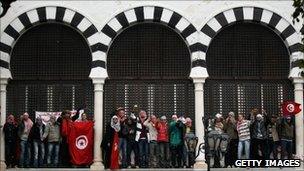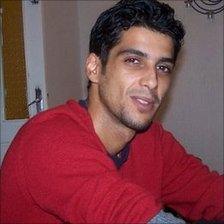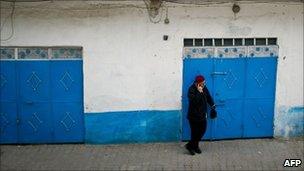Tunisia turmoil: Diary from Tunis
- Published

People are protesting in front of the Prime Minister's office
Tunisia has formed a national unity government, the country's prime minister has announced, after a popular revolt ousted the president. Days of violence have cut off supplies to shops and petrol stations, causing shortages.
Here, Majdi Calboussi, a 29-year-old software developer living in the suburbs of Tunis, documents life in the Tunisian capital. This diary is translated from Arabic by BBC Arabic.
Monday 24 January

Majdi Calboussi describes the ongoing protests in Tunis
Chaos has returned to some extent to the capital in Tunisia.
A number of convoys came from across the country to protest the government's decision to remain in power as a transitional authority.
People have assembled in front of the prime minister's office in an attempt to bring down government.
The trade unions are the main body behind the call for these gatherings and can be seen as the cause of chaos.
Their request is a legitimate one and people agree with it. The problem is they haven't given any suggestions or solutions, raising doubts about the effectiveness of their speech and strategy.
The government has proposed to stay in power until things cool down but the majority of people reject this.
There is a large number of people gathered at Bourguiba Street in downtown Tunis.
Everyone with a demand is heading out there to give a speech, but these speeches and gatherings don't last for a long time.
What has changed from the past days is that since Sunday there has been an increase in the participation of members of the police force.
Cafes and shops are open and crowded.
I have not seen any violence; all demonstrations have been peaceful so far. It is as if the people have realised that this is the only way to achieve what they are asking for.
There is a protest rally today. A large number of people are coming from different areas. I am personally in favour of it.
The government on the other hand acts as if the situation is normal and deals with the demands of the people with naivety.
Some people do not support the protests. They want things to go back to normal for the good of the economy. Others think this is time for a change and that they must continue to demonstrate.
Wednesday 19 January

Majdi Calboussi says life is slowly going back to normal
The situation in Tunisia has now started to go back to normal.
Commercial goods have been distributed to stores, cafes and shops, and buying and selling rates are back to their normal pace.
For example, when I went to work this morning, I could not find a place to park my car as there were many other cars parking, similar to any regular day.
Prices are stable and there is no monopoly on products. Cafes and stores opened their doors and there are no queues outside bakeries.
What has changed is the lack of fear and the ability of the people to speak freely about the events surrounding them.
The security curfew now begins at 2000 and finishes at 0500. All checkpoints have been removed, and the presence of the army fell compared with previous days.
As a citizen I feel that the situation has become more peaceful. The police station in my neighbourhood is operative and open to all, which indicates that civilian life is back to normal.
On the other side, most governmental departments have opened their doors to the public.
The National Fund for Healthcare, which is opposite my office, has reopened today. The post office and the telecommunication ministry reopened on Monday.
I have noticed that people are becoming interested in what is happening in relation to the ministers, their appointments and resignations.
Monday 17 January
Normal life is beginning to return to the capital. The authorities began to distribute gas cylinders on Sunday and people were glad that some local bakeries were distributing free bread. Not everyone is able to bake bread at home.
There was also the fear that there was going to be a shortage of essential food items.
On Sunday, prices of some items had doubled - particularly fruit and vegetables. But prices returned to normality today.
Many stores have opened their doors to customers today. Hospitals and private clinics have begun to receive patients again. Almost all the essential shops - such as pharmacies - opened in my neighbourhood today and I was even able to visit the dentist.
I decided to go back to work today. I took a taxi to the city centre near the Avenue Mohammed V. I run my own software development company, and asked the 15 staff to come in for only half a day until 1300 (1200 GMT) - so they can still reach home in good time.
Saturday 15 January
Today was the first time since the unrest began about a month ago that I was hit by a policeman.
He didn't like the fact I was walking the streets with a camera. Since the announcement of the state of emergency and a curfew, there has been a heavy police presence in the city. The police were about to detain me when a soldier intervened and persuaded them to let me leave.
There is a general feeling that the army - who are only guarding strategic locations - are more sympathetic and in tune with the public mood than the police. You can really feel that in the different ways a soldier or a policeman treats you.
There's no such thing as normal life here. Public buildings and institutions are closed. Shops have been broken into and roads looks like something out of a war zone - it's like a scene from the Iraqi city of Falluja in 2003.
I also came across soldiers setting up checkpoints - supported by tanks in some in some cases - in central thoroughfares such as Avenue Habyib Bourguiba, as well as in suburban areas. Soldiers have the power to stop and search pedestrians and cars.
But in neighbourhoods like Al Muruj where I live, people have set up their own neighbourhood defence forces, with volunteers armed with sticks and knives. Every now and again, we also see helicopters hovering above.
We are still following developments on news channels. We heard earlier about the arrest of Ali Seriati, the ex-head of presidential security, who is accused of fomenting violence.
Authorities also confirmed today that the water is safe to drink. This was in response to the rumours that started circulating that the drinking water was poisoned.
- Published19 January 2011